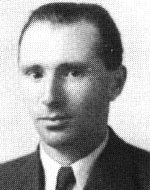Duklor, Yosef (Gondar Amihud)
Son of Tzippora and Aryeh. He was born in Odessa, Russia in 1905. In Odessa he graduated from high school and polytechnic, and in 1924 immigrated to Eretz Israel and was one of the founders of Betar’s Palestine branch and one of its first commanders. In 1928, he completed the first course of the school for instructors under the command of Yirmiyahu Halpern and was the first commander of the Betar branch in Tel Aviv and was among the activists of the “Hebrew Language Defenders Battalion.” In the 1929 riots he discovered courage in defending the neighborhood Shapira at the end of Tel Aviv, in a group of Betar fighters carrying weapons.In 1932 he went to Europe and organized and commanded courses for Beitar instructors in Czechoslovakia, Hungary and Romania. In this capacity, he had a severe cold and contracted tuberculosis, but he had to abandon his position until they had finished. On his return to Israel, his illness worsened and he was hospitalized in Safed, but at the outbreak of the 1936 riots, he abandoned the hospital in order to return to Betar and the ranks of the Irgun Zvai Leumi. Among his comrades, his commanders and subordinates were known for his peace of mind, his manner, his industriousness and his devotion to every role he served. Among the positions he held at that time was the command of the Irgun branch in Rosh Pina, most of whose members were members of the Betar recruitment company in the village. After the arrest of the Irgun (30.8.1939), he was among the members of the Emergency Command, which served until the release of the commander of the organization, David Raziel, from the detention camp (October 1939) and returned to his post. When he discovered that close to the end he had dictated to one of his close friends his will, in which he said, among other things: “In the grave, my instrument must be placed in perfect order and in the left hand of the national flag.” This will was fulfilled on the day of his death, He was buried on the Mount of Olives and buried next to the tomb of Yaakov Raz of the underground, and left a wife, who was immortalized in the book “Zachremam Netzach” After the Six Day War, the family discovered that the Jordanians had paved the road to Jericho on the grave, and therefore tombstones were erected on the Mount of Olives, at the presumed burial place, and in the missing persons’ section on Mount Herzl.
